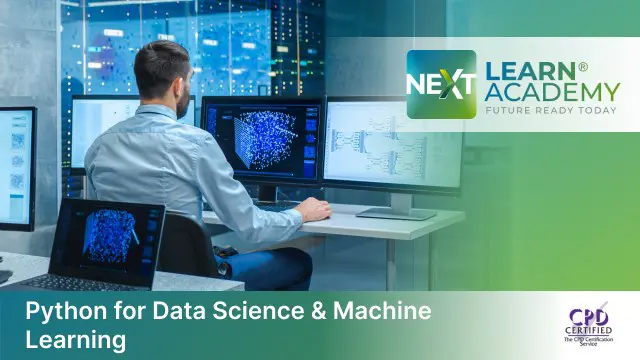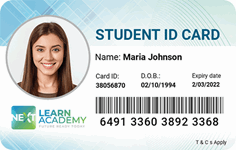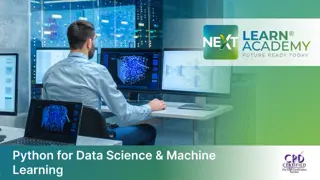- Exam(s) / assessment(s) is included in price

Python for Data Science & Machine Learning
**3 FREE Course OFFER** | Accredited by CPD | FREE PDF Certificates | Unlimited Access for 365 Days | No Hidden Fees
Next Learn Academy
Summary
Overview
----SPECIAL OFFER----SPECIAL OFFER----SPECIAL OFFER----
➽➽➽Buy 1 Get 3 OFFER!
***Get 3 FREE Complimentary Courses + PDF Certificates***
- Course 1 : Learning Data Analysis with R
- Course 2 : Microsoft Project
- Course 3 : MS Project and SPSS Statistics
**FREE PDF Certificates Included**
Python for Data Science & Machine Learning - Level 3
Python is commonly used for website and software development, task automation, data analysis, and data visualisation. Python is the number one programming language choice for machine learning, data science, and artificial intelligence. This course will teach you how easy it is to become a professional Python programmer and create programmes, applications, scripts, games, and much more.
Our main goal in this practical, hands-on course, where we blend practical work with solid theoretical training, is to provide you with the education not only to understand the ins and outs of Python Programming, but also to learn exactly how the software development industry works, the various roles within a team, and how to land a Python Programming job without a degree.
We understand that theory is important to build a solid foundation, but theory alone will not get the job done, which is why this course is jam-packed with practical hands-on examples and case studies that you can follow step by step.
Get Started Today!
- Accredited by IAP
- Unlimited Access for 365 Days
- Free PDF Certificate Included
Why You Should Learn at Next Learn Academy?
Python for Data Science & Machine Learning – Level 3 is brought to you by Next Learn Academy. We are a leading online education provider for several accredited organisations, and provide learners the opportunity to take this IAP course. At Next Learn Academy, we give our fullest attention to the learners’ needs and ensure they have the necessary information required to proceed with the training.
Our priority is on the advancement of knowledge and skills, we are bound to facilitate everything required to confirm a top-notch education service. We vouch for our learners an exclusive learning experience by paying close attention to each of their unique requirements and coming up with solutions every time. We provide them with state-of-the-art facilities using the latest technology.
Course media
Description
COURSE CURRICULUM
Module 01 : Introduction to Python for Data Science & Machine Learning From A-Z
- Who is this Course for?
- Data Science + Machine Learning Market Place
- Data Science Job Opportunities
- Data Science Job Roles
- What is a Data Scientist?
- How to Get a Data Science Job
- Data Science Projects Overview
Module 02 : Data Science & Machine Learning Concepts
- Why We Use Python
- What is Data Science?
- What is Machine Learning?
- Machine Learning Concepts & Algorithms
- What is Deep Learning?
- Machine Learning vs Deep Learning
Module 03 : Python for Data Science
- What is Programming?
- Why Python for Data Science?
- What is Jupyter?
- What is Google Colab?
- Python variables, booleans
- Getting Started with Google Colab
- Python Operators
- Python Strings
- Python Numbers & Booleans
- Python Conditional Statements
- Python for Loops and While Loops
- Python Lists
- More About Lists
- Python Tuples
- Python Dictionaries
- Python Sets
- Compound Data Types & When to Use Each One?
- Python Functions
- Object - Oriented Programming in Python
Module 04 : Statistics for Data Science
- Introduction to Statistics
- Descriptive statistics
- Measure of Variability
- Measure of Variability Continued
- Measures of Variable Relationship
- Inferential Statistics
- Measure of Asymmetry
- Sampling Distribution
Module 05 : Probability and Hypothesis Testing
- What Exactly is Probability?
- Expected Values
- Relative Frequency
- Hypothesis Testing Overview
Module 06 : NumPy Data Analysis
- Intro Numpy Array Data Types
- Numpy Arrays
- Numpy Arrays Basics
- Numpy Array Indexing
- Numpy Array Computations
- Broadcasting
Module 07 : Pandas Data Analysis
- Intro to Pandas
- Intro to Pandas Continued
Module 08 : Python Data Visualization
- Data Visualization Overview
- Different Data Visualization Libraries in Python
- Python Data Visualization Implementation
Module 09 : Introduction to Machine Learning
- Introduction to Machine Learning
Module 10 : Data Loading & Exploration
- Exploratory Data Analysis
Module 11 : Data Cleaning
- Feature Scaling
- Data Cleaning
Module 12 : Feature Selecting and Engineering
- Feature Engineering
Module 13 : Linear and Logistic Regression
- Linear Regression Intro
- Gradient Descent
- Linear Regression + Correlation Methods
- Linear Regression Implementation
- Logistic Regression
Module 14 : K Nearest Neighbors
- Parametric Vs Non - Parametric Models
- Eda on Iris Dataset
- The KNN Intuition
- Implement the KNN Algorithm from Scratch
- Compare the Result with the Sklearn Library
- Hyperparameter Tuning Using the Cross - Validation
- The Decision Boundary Visualization
- Manhattan Vs Euclidean Distance
- Feature Scaling in KNN
- Curse of Dimensionality
- KNN Use Cases
- KNN Pros and Cons
Module 15 : Decision Trees
- Decision Trees Section Overview
- EDA on Adult Dataset
- What is Entropy and Information Gain?
- The Decision Tree ID3 Algorithm from Scratch Part 1
- The Decision Tree ID3 Algorithm from Scratch Part 2
- The Decision Tree ID3 Algorithm from Scratch Part 3
- ID3 - Putting Everything Together
- Evaluating our ID3 Implementation
- Compare with Sklearn Implementation
- Visualizing the Tree
- Plot the Important Features
- Decision Trees Hyper - Parameters
- Pruning
- [Optional] Gain Ration
- Decision Trees Pros and Cons
- Predict Whether Income Exceeds $50K/yr - Overview
Module 16 : Ensemble Learning and Random Forests
- Ensemble Learning Section Overview
- What is Ensemble Learning?
- What is Bootstrap Sampling?
- What is Bagging?
- Out-of-Bag Error (OOB Error)
- Implementing Random Forests from Scratch Part 1
- Implementing Random Forests from Scratch Part 2
- Compare with Sklearn Implementation
- Random Forests Hyper-Parameters
- Random Forests Pros and Cons
- What is Boosting?
- AdaBoost Part 1
- AdaBoost Part 2
Module 17 : Support Vector Machines
- SVM Outline
- SVM Intuition
- Hard vs Soft Margins
- C Hyper - Parameter
- Kernel Trick
- SVM - Kernel Types
- SVM with Linear Dataset (Iris)
- SVM with Non-Linear Dataset
- SVM with Regression
- [Project] Voice Gender Recognition Using SVM
Module 18 : K-Means
- Unsupervised Machine Learning Introduction
- Unsupervised Machine Learning Continued
- Data Standardization
Module 19 : PCA
- PCA Section Overview
- What is PCA?
- PCA Drawbacks
- PCA Algorithm Steps (Mathematics)
- Covariance Matrix vs SVD
- PCA - Main Applications
- PCA - Image Compression
- PCA Data Preprocessing
- PCA - Biplot and the Screen Plot
- PCA - Feature Scaling and Screen Plot
- PCA - Supervised vs Unsupervised
- PCA - Visualization
Module 20 : Data Science Career
- Creating a Data Science Resume
- Data Science Cover Letter
- How to Contact Recruiters
- Getting Started with Freelancing
- Top Freelance Websites
- Personal Branding
- Networking
- Importance of a Website
Method of Assessment
This is a knowledge-based course, and thus, will contain no method of assessment.
Certification
Upon the successful completion of the course, learners will be awarded an accredited ‘Certificate of Completion’ for ‘Python for Data Science & Machine Learning - Level 3’ by IAP.
About the Tutor
Juan Galvan is a visionary marketer, and digital entrepreneur. He has been effective in enabling digital businesses to reach the next level of success. He believes in continued education and wants to share his extensive knowledge and experience as a coach, consultant, and strategist with others. He aims to enable learners to expand their skillset in digital marketing, web development, programming, and e-commerce. Juan Galvan will guide you to make critical business decisions, develop unique ways to deliver products in the marketplace, and have clarity and confidence in your business.
Who is this course for?
- Students
- Aspiring Python Developers
- IT professionals
Requirements
A basic understanding of English, ICT and numeracy would be beneficial
Career path
- Python Developer
- Data Scientist
- Machine Learning Engineer
- Python has been adopted by many non-programmers too such as,
- Accountants
- Scientists
Questions and answers
Currently there are no Q&As for this course. Be the first to ask a question.
Reviews
Currently there are no reviews for this course. Be the first to leave a review.
Legal information
This course is advertised on Reed.co.uk by the Course Provider, whose terms and conditions apply. Purchases are made directly from the Course Provider, and as such, content and materials are supplied by the Course Provider directly. Reed is acting as agent and not reseller in relation to this course. Reed's only responsibility is to facilitate your payment for the course. It is your responsibility to review and agree to the Course Provider's terms and conditions and satisfy yourself as to the suitability of the course you intend to purchase. Reed will not have any responsibility for the content of the course and/or associated materials.
FAQs
Interest free credit agreements provided by Zopa Bank Limited trading as DivideBuy are not regulated by the Financial Conduct Authority and do not fall under the jurisdiction of the Financial Ombudsman Service. Zopa Bank Limited trading as DivideBuy is authorised by the Prudential Regulation Authority and regulated by the Financial Conduct Authority and the Prudential Regulation Authority, and entered on the Financial Services Register (800542). Zopa Bank Limited (10627575) is incorporated in England & Wales and has its registered office at: 1st Floor, Cottons Centre, Tooley Street, London, SE1 2QG. VAT Number 281765280. DivideBuy's trading address is First Floor, Brunswick Court, Brunswick Street, Newcastle-under-Lyme, ST5 1HH. © Zopa Bank Limited 2024. All rights reserved.





